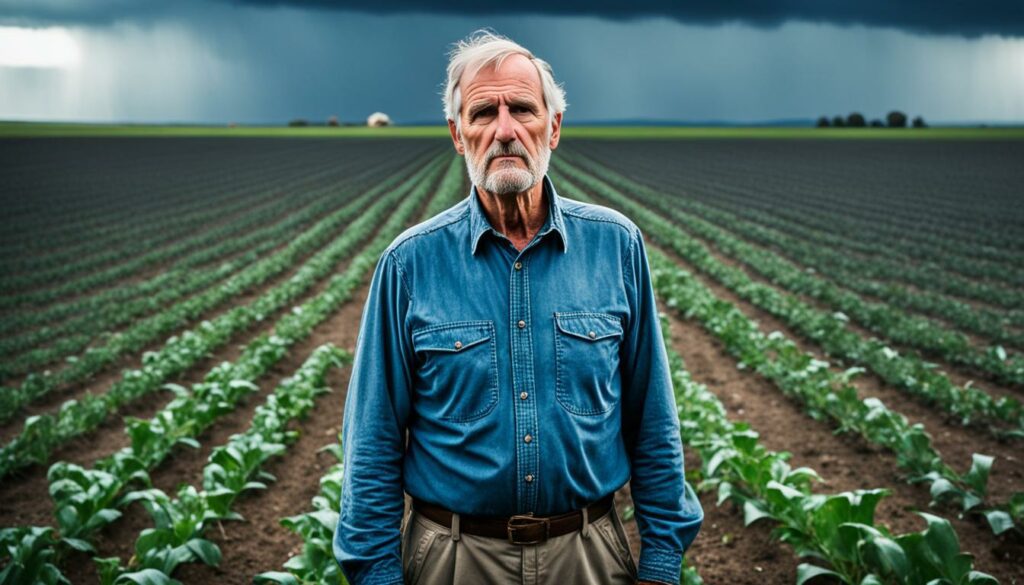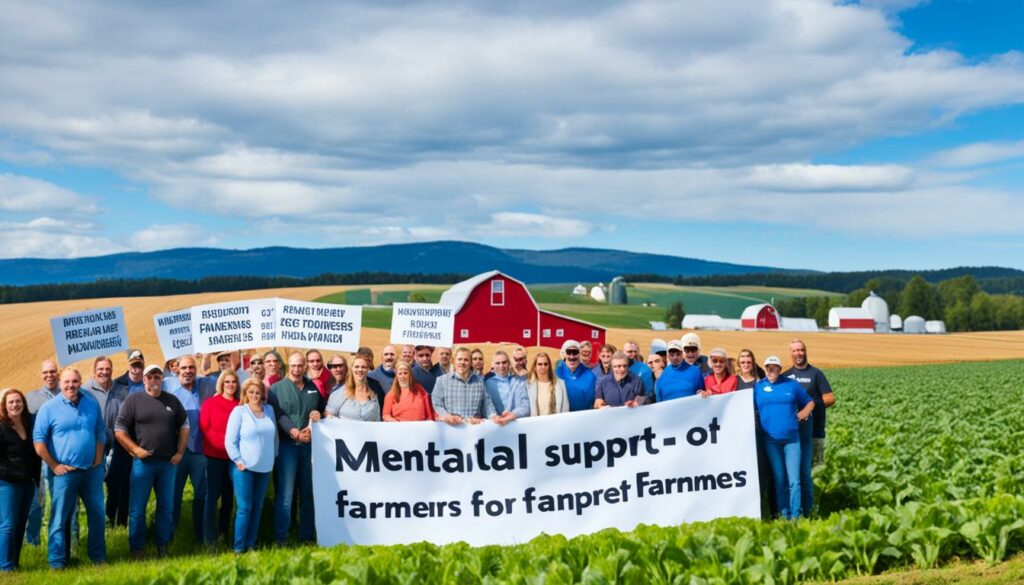Menu

In 2016, the male suicide rate among farmers and ranchers was 43.2 per 100,000. This was higher than the rate for male working-aged adults in general, which stood at 27.4. These figures show the urgent need to tackle the mental health stigma in farming. The stress from economic challenges and environmental issues plays a big role in farmers’ mental health.
Living in rural areas means a higher risk of mental health issues for those in farming compared to city dwellers. Problems like low prices for goods, growing debts, and not enough workers are making things worse. The pandemic has added to these challenges. Social isolation, getting older, and physical health problems all add to the stress. But the biggest obstacle is the shame often tied to mental health care.
Farmers face unique mental health challenges. I want to explore why they struggle, the impact on their wellbeing, and what can help. Farming can be isolating and bring economic pressure. This leads to higher levels of mental distress among those in this line of work.
The suicide rate among male farmers in 2016 was 43.2 per 100,000. This rate is higher than the 27.4 for all other male workers. Farm operators and workers have a higher suicide risk than other groups. Mental illness is more common in rural areas. This stresses the need for good mental health support in the countryside.
People in agriculture often have heart disease and high blood pressure due to stress. Depression is common and can show as sadness, anxiety, irritability, and lack of interest in usual activities. Anxiety issues can make daily life harder by affecting social life, focus, and sleep.
Border regions between the US and Mexico greatly affect farmworkers’ health. Studies in West Greece, Tennessee, and Queensland also show this. Training advisory agents to help with mental health was found to be effective.
Destigmatizing mental illness in farming requires strong mental health support. It means knowing and addressing issues like money troubles and isolation that worsen farmers’ mental health. By tackling these problems, we can create a more supportive and resilient culture in farming.
The well-being of farmers is deeply affected by many factors. The unique pressures of the agricultural sector hit hard, especially on farmers’ mental health. This demands the urgent need for farmers to get comprehensive mental health support.
Farmers face a lot, like the weather’s twists and turns and market price changes. These challenges take a direct hit on their mental health, leading to more stress. The income from farming has been dropping in many areas since 2013-2014, making life tough for farmers.Dealing with rules, paperwork, and new tech also complicates things, adding to their stress.

Living in isolated areas and working alone for long hours is common among farmers. This lack of social contact and isolation can make farmers feel very lonely. A study showed that social isolation jumped by 22% in farming communities.For many, this mix of isolation and loneliness can lead to serious mental health problems.
The mix of money problems, unpredictable weather, and little social life can be devastating. The suicide rate is very high among farmers, much higher than the national average. In 2019-2020 in the UK, 133 farmers took their own lives.These chilling numbers show clearly that farmers need strong mental health support. This trend is also seen in the US, where the farmer suicide rate is 3.5 times higher than the national rate in 2019. Older male farmers are particularly at risk because they’re less likely to reach out for help.
Depression and anxiety affect many in farming. The work’s demands and unpredictability make it hard for farmers. Studies show they face deep and varied mental health issues needing help and change.
In West Greece, a big study looked at farmers’ health and how it affects them. This is different from research on the US-Mexico border. That study found stress and culture impact the health of farmworkers. Both show the unique struggles of farming communities.
Tennessee found out what makes farm residents feel down and how they cope. Australian research also highlighted many farmers’ mental health issues. These studies show how we must tackle mental health globally in farming.
Over ten years, a study found money worries lead to health issues for farming couples. This shows that money problems have a long-lasting effect on mental health. Financial struggles and animal neglect are pressing issues. They highlight the need for better mental health support for those in agriculture.
The World Health Organization brings new hope and awareness to mental issues. It’s crucial for those in farming because suicide rates are high among them. This shows we face a big crisis in mental health in this sector.
Efforts like Farm-Link and Farm Partners offer support to farmers. It underlines the importance of mental health help for farming communities. These steps are positive towards solving mental health issues in farming.
Starting to talk about farmer mental health means knowing the signs. Spotting these signs early can help prevent worse problems. It’s key in farming, where mental health can be overlooked, to understand these signs.

Changes in behaviour or mood are common warning signs. Those with depression may feel very sad, anxious, irritable, or lose interest in fun things. People with anxiety might worry a lot, making it hard to be with others or do daily tasks. Talking openly about farmer mental health is crucial for spotting these early signs.
Here’s a look at mental health signs in different groups:
| Occupational Group | Suicide Rate per 100,000 (2016) | Prevalent Mental Health Conditions |
|---|---|---|
| Farmers and Ranchers | 43.2 | Depression, Anxiety, Chronic Stress |
| Male Working Aged Adults (all occupations) | 27.4 | Depression, Anxiety |
The impact of mental health issues can be different for each person. Long-term stress can lead to physical health problems like irritability, headaches, and heart issues. In rural areas, mental illnesses like depression and anxiety are common, showing the need for more mental health care.
Recognising how serious a mental health issue is can be life-saving, especially in high-pressure jobs like farming. If someone feels suicidal or talks about hurting themselves, they need help right away. Talking openly about mental health in farming makes it easier to ask for help.
Find out where to get support by visiting Rural Health Information Hub.
In the agriculture world, stigma is a major issue. It stops many from getting the mental health help they need. Breaking the silence about farmer mental health is vital for saving lives. The stats are worrying: the agricultural sector shows one of the highest suicide rates. Between 2019 and 2020, 133 UK agriculture workers took their lives.
This high rate is especially seen in jobs like crop harvesting and animal rearing. They face almost double the risk of suicide compared to the average. The fear of being judged or misunderstood keeps many from seeking help, especially in rural areas.
“Stigma prevents individuals from reaching out for help because they fear being judged or misunderstood. This is especially true in rural and farming communities where mental toughness is often equated with personal strength.”
We must work hard to end the stigma around farmer mental health. The numbers show a big problem: farmers are not as likely to get help as the rest of the population. They often feel isolated and have a hard time finding health services.
The younger farmers are also struggling. In Scotland, 4 out of 5 under 40s say mental health is their top concern. They often do not reach out for help because of financial stress. The income from a 500-hectare UK farm fell from £80,000 in the mid-90s to just £2,500 in 2000/2001. This sharp drop leaves less than half of farmers able to make a living from farming alone.
We all need to work together on this issue. Society must raise awareness and understanding in agricultural areas. We must accept mental health issues without the burden of stigma. This is the only way to help farmers get the support they need without feeling judged.

Addressing the mental health stigma in farming areas is crucial. The male suicide rate among farmers is high. It’s higher than that of male adults in all jobs. This shows we urgently need to tackle mental health issues in farming.
Mental health issues are more common in rural areas. This happens more than in cities. Economic problems like low prices, more debt, and lack of workers make things worse. These problems can lead to irritability, depression, and anxiety in farmers.
The Suicide Prevention Resource Center says farmers have the highest suicide rate in the U.S. This is because of isolation, financial worries, and trouble getting healthcare. These challenges show how important it is to support mental health in farming communities.
“Promoting awareness and facilitating open discussion about mental health in farming communities will pave the way towards breaking down the stigma. Accessibility to mental health resources and fostering a supportive environment are vital steps.” – Expert opinion
Encouraging farmers to talk about their mental health reduces stigma. It’s important to listen and ask questions without judging. Experts say these tactics can help farmers facing mental health problems.
Seeking help is a brave step for farmers and farm workers. By supporting their mental health and including mental health services, we can reduce the stigma. Encouraging mental well-being can make a big difference in farming communities.
| Challenges/Stressors | Impact on Mental Health |
|---|---|
| Falling Commodity Prices | Increased anxiety, depression |
| Natural Disasters | High stress, mental fatigue |
| Increasing Farm Debt | Depression, suicidal thoughts |
| Labour Shortages | Irritability, anxiety disorders |
| Trade Disputes | Stress, insomnia |
Farmers face many challenges, making mental health help critical for rural areas. Support must cover national helplines and local projects. This way, farmers get the best chance at help.
Several hotlines offer instant support. The Farm Aid Hotline is at 800-FARM-AID (327-6243), open Monday to Friday, 9:00 a.m. to 9:00 p.m. EST. The National Suicide Prevention Lifeline at 988 and Crisis Text Line by texting “HOME” to 741-741 are open all day for urgent needs. Plus, 2-1-1 helps find local mental health help.
Nonprofits are key in mental health care for farmers. The National Farmers Union’s Farm Crisis Center and the American Farm Bureau Federation’s Farm State of Mind website offer key help. The American Connection Project Broadband Coalition helps improve rural mental health support.
| Resource | Contact Information | Availability |
|---|---|---|
| National Suicide Prevention Lifeline | 988 | 24/7 |
| Crisis Text Line | Text “HOME” to 741-741 | 24/7 |
| Farm Aid Hotline | 800-FARM-AID (327-6243) | Mon–Fri, 9:00 a.m. – 9:00 p.m. EST |
| 2-1-1 | 211 | Varies by location |
By using these resources, we can give farmers the vital support they need. This helps them face the challenges and stress of farming better.
Farmers’ success stories after getting mental health support show how important it is to talk and find help. They prove that fighting the stigma around mental health in farming areas leads to positive changes.
In Zimbabwe, the Friendship Bench project started with few mental health professionals. They put benches in over 70 communities, helping hundreds of farmers. This simple approach led to the recovery of many people.

In Australia, rural areas deal with tough mental health problems, like more suicide. But, groups like the Do More Ag Foundation in Canada show education can make a difference. They use #DoMoreAg to share info and encourage chats about mental health.
India changed its laws in 2017 to help farmers facing mental health issues. This move was important after almost 60,000 farmer suicides. Now, many farmers feel safe to get help without fear of punishment.
Studies in Canada tell us that many farmers struggle with their mental health. But, thanks to community efforts and support services, they find their way back from depression, anxiety, and high stress.
In Alberta, agriculture is a big part of the economy and farmers face unique challenges. Despite that, with the right help, many have managed to fight mental health problems successfully.
Dealing with mental health issues in farming is vital.
Farming makes up only 1.5% of the British economy. Yet, it sees 24% of workplace deaths. Shockingly, in 2019-20, 133 within the UK farming community took their own lives. This brings up the urgent need to tackle high suicide rates.
Focusing on mental health education for those in farming can help ease these issues. Around 80% of young farmers in Scotland worry most about their mental health. Farming’s financial pressures and isolation add to this stress. Sadly, farmers often don’t seek help for their mental health problems, unlike others.
Norwegian farmers show more signs of despair than the general population. They face economic struggles too. For example, the average income of a 500-hectare farm in the UK crashed from £80,000 to £2,500 in five years. Smaller farms are at even more risk, with their size linked to higher suicide rates.
Here are key stats that show why mental health education is so vital for farmers:
| Indicator | Data |
|---|---|
| Workplace Deaths in Agriculture | 24% |
| Suicides in UK Agriculture (2019-20) | 133 |
| Farmers in Scotland Viewing Mental Health as Major Issue | 80% |
| Reduction in Farm Income (1995/96 to 2000/01) | From £80,000 to £2,500 |
Helping agricultural workers deal with stress is key. Better education and training on mental health can make a huge difference. This could lead to more understanding, less shame, and better support. Solving these mental health issues is essential for a stronger, more resilient farming community.
Government policies greatly affect how we help farmers’ mental health in agriculture. Shocking data shows the high suicide risk among male farmers and ranchers. They are more at risk than men of the same age working in other jobs.
Efforts should focus on making mental health help easier to get in the countryside. Designing policies to attract mental health experts to rural areas is key. This makes important help closer to farmers and their families. Training farmers in mental health can also be a big help. It equips them to deal with common issues like stress and depression.
Government support can also tackle the tough conditions that ruin farmers’ mental health. A 2020 report showed suicide rates going up among farmers. It’s clear that direct help during hard times, like when the economy is not doing well, is needed. This kind of support can ease the stress that leads to serious mental health problems.

Another approach that works is teaching mental health first aid in rural areas. This helps local people identify and help with mental health problems. It’s vital because many farming areas lack easy access to mental health services.
About 55.5% of Canadian farmers say they’ve battled stress and mental health issues. This number highlights the widespread problem of mental health in farming. It shows we need strong mental health support in farming policies.
To sum up, government policies are key to mental health in agriculture. By supporting services, offering training, and easing financial and environmental stress, we can make a real difference. This will help farmers lead mentally healthier lives and build a stronger farming sector.
Building resilience in farming areas involves methods to improve their mental health. Farmers face a higher risk of mental health issues, including a high suicide rate. To help, we must focus on tailored strategies.
A recent survey highlights key issues affecting mental health in rural areas. It shows that stigma, lack of mental health help, and various stress sources are big problems. Addressing these issues needs more awareness and less stigma.
Creating stronger social bonds in rural places is vital. It helps to reduce stress and worry. Also, supporting Mental Health First Aid programmes in the countryside is key, as they are proven to work.
Research by Jones-Bitton and colleagues in 2019 found that mental health challenges vary in farming areas. For example, over a quarter of Canadian farmers report high stress and anxiety. This shows we need specific solutions for the pressures they face.
| Year | Region | Study | Depressive Symptoms (%) |
|---|---|---|---|
| 1995 | Ohio | Elliott et al. | 1.87 |
| 2000 | Iowa and Colorado | Scarth et al. | 11.1 |
| 2019 | Canada | Jones-Bitton et al. | 25.7 |
Techniques like stress management and mindfulness can boost resilience. They help farmers take care of their mental health. Mental Health First Aid is also very helpful in rural areas.
To sum up, helping farmers with their mental health involves many steps. From better social support to full mental health training, these efforts can make a big difference. They aim to improve mental wellbeing in farming communities.
Community support helps keep farmers mentally well in agriculture. The pressure from money issues and nature’s hurdles can hurt mental health. Talking openly about mental health in farming groups can ease these burdens and create a caring space.

Recognising and valuing community engagement is key to closer ties. Many farmers feel alone when coping with mental health challenges. With 133 suicides in UK agriculture from 2019-20, it’s clear we need to be each other’s pillars. It’s vital to understand that smaller farms can face more stress and need more support.
| Factors | Impact on Farmers’ Mental Health |
|---|---|
| Community Engagement | Reduces isolation and provides a support network |
| Stress Levels | High due to financial challenges and long-term exposure to chemicals |
| Accessible Mental Health Resources | Helps in managing mental health effectively through support mechanisms |
| Open Dialogues | Encouraging open conversations about mental health reduces stigma |
It’s crucial to talk openly about mental health to fight its stigma and offer help. Research shows farmers suffer more from mental illness than city dwellers, with depression and anxiety common. Suicide rates are also high among farmers, underlining the need for non-stop talks. By making such talks normal, we can boost mental health support in agriculture.
Farming is tough on the body and mind. Creating strong community bonds and a culture of talking about mental health is critical. With everyone chipping in, we can help farmers handle their issues better.
The talk about mental health in agriculture shows it’s a real issue needing urgent attention. Facts show farm families are under a lot of stress, leading to serious mental health problems. Shockingly, although farmers make up only 1.5% of the UK’s economy, they account for 24% of work-related deaths. The number of suicides in UK agriculture is also alarming, with 133 cases in 2019-20. This reveals how deeply mental health problems affect farmers.
The evidence clearly says that farmers need more support. Many young farmers in Scotland see mental health as their top issue. But, they often don’t seek help as much as others. With the agriculture industry having the highest suicide rate, the situation is dire. We must offer mental health support to farmers. This can help them cope with stress and become more resilient.
It’s vital to work together to end the stigma around mental health. We need to make care easy to get for people in rural areas. To do this, talking openly about mental health, improving access to services, and creating strong support systems are key. Everyone involved must fully back these efforts. Together, we can ensure that farmers enjoy good mental and emotional health. This is essential for their wellbeing and for the health of our farming communities.
It lets individuals get help without fearing judgment. This is vital for farmers. Stigma hinders accessing support, which when removed, improves their mental wellness.
Depression and anxiety are common among farmers. These are made worse by financial and environmental issues, isolation, and healthcare access problems. Knowing these challenges helps to offer the right help.
Things like market changes and bad weather can greatly affect a farmer’s mental state. They can cause high levels of stress and depression.
Farmers often work alone, for long hours. This can make them feel lonely and worsen their mental problems.
Symptoms include long periods of sadness, avoiding friends, sleep and eating changes, and trouble focusing. Seeing these signs early on means help can be given sooner.
Fearing judgement, workers might avoid getting help for mental issues. This can stop them from accessing necessary support, making their problems worse.
There are many hotlines like the Farm Aid Hotline and the 988 Suicide and Crisis Lifeline for immediate help. Local groups and not-for-profits also offer specific support that farmers might find helpful.
Yes, telling stories of how help made a difference can break down stigma. These tales inspire people to seek the help they need.
Teaching about mental health can help workers cope better and stay healthy. Knowing about symptoms and issues makes for a more supportive community.
Policies can encourage mental health services in rural areas and add mental health training in farming courses. This would make getting care and learning about mental health easier.
Help build strong social networks, offer ways to reduce stress, and provide mental health help. These steps recognise the stress farmers face and help create a supportive space.
Encouraging open talk and offering support from the community can really help. It makes it easier for farmers to handle stress and reach out for help.